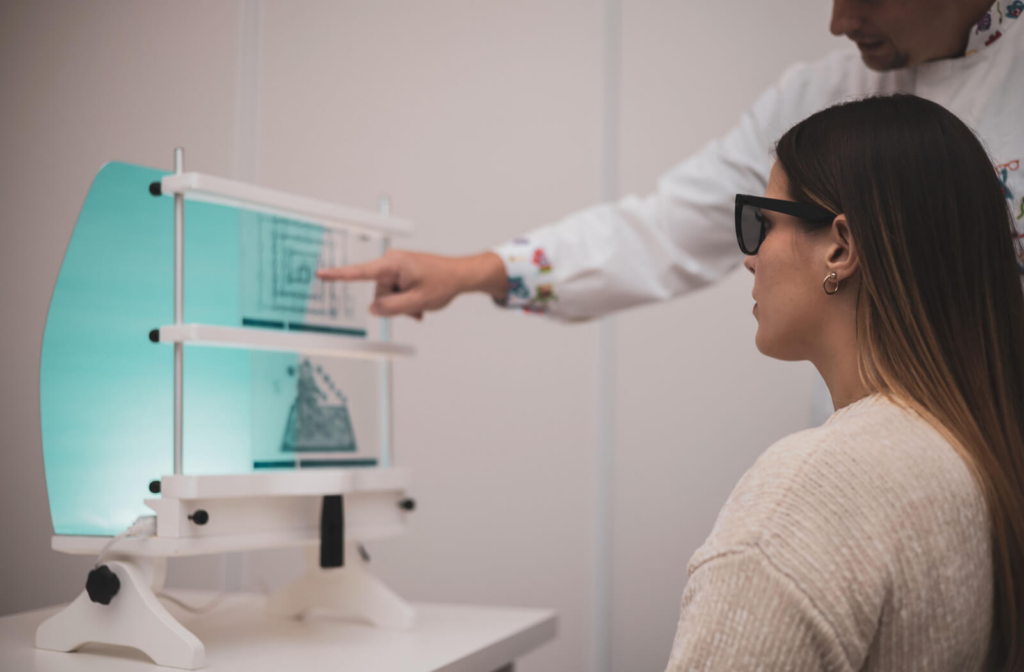Vision therapy is like physical therapy for the eyes and brain. It aims to help people with visual problems that glasses or contacts can’t treat alone.
Many people think their eye doctor only provides vision therapy for children, but this is untrue. Vision therapy can help adults manage many visual challenges effectively, such as those related to brain injuries and sports performance.
What Is Vision Therapy?
Vision therapy is a personalized program designed to support the function of your visual system and is provided under the supervision of an optometrist.
Vision therapy involves different exercises and activities that can help your brain and eyes work together effectively as your brain adapts with the help of neuroplasticity. Vision therapy can help both children and adults interpret and process visual information effectively.
Visual acuity isn’t just limited to 20/20 vision. There are 17 visual skills vital for succeeding in reading, learning, and sports. Checking your visual skills is important for detecting problems that can be addressed with vision therapy, which is why vision therapy programs often start with a thorough consultation.
Vision Therapy for Adults
Vision therapy isn’t only for children. Children with unaddressed visual problems can become adults with the same problems, and adults are often motivated to improve their vision, as they are aware of the impact vision problems can have on their daily lives.
Vision therapy for adults can include a personalized treatment plan using various tools and exercises, such as prisms, therapeutic lenses, filters, patches, balance boards, and electronic games and activities. A treatment program may have in-office and at-home exercises to help strengthen essential visual skills, including the following:
Eye Movement
Eye movement is necessary for tracking objects or people as they move at varying speeds and distances. Your eye movements, such as saccades, smooth pursuit movements, and vergence movements, can help you focus on objects.
Binocular Coordination
Binocular coordination is how your eyes work together. Vision therapy for binocular coordination can help correct conditions such as amblyopia and strabismus, where one eye may be stronger than the other, or the eyes don’t align properly.
Accommodation
Accommodation is your eye’s ability to focus on something, stay focused, and change focus at different distances, such as near to far, without discomfort.
Visual Memory
Visual memory is your ability to remember visual information. Problems with visual memory can make writing notes from a board or retaining information while studying harder.
Depth Perception
Depth perception is your ability to judge distances between yourself and another object or person—that is, are they farther or closer? Depth perception is vital for spatial awareness in many activities, such as catching and throwing.
Hand-Eye Coordination
Hand-eye coordination is how well you use your eyes and hands to interact with the world. This visual skill is necessary for many jobs and sports.

Benefits of Vision Therapy for Adults
Each person has different visual needs and challenges. However, with motivation, many adults can see improvements in their vision.
The potential benefits of vision therapy for adults include:
- Reduced eye strain: Many adults experience eye strain due to prolonged computer use, reading, and other close-up visual tasks. Vision therapy can help reduce digital eye strain and other forms of eye strain during these activities.
- Improved quality of life: Visual problems can impact daily life. For example, they can make driving, reading, or participating in sports difficult. Vision therapy can improve visual skills and make it easier to perform these activities.
- Improved work performance: Many jobs require good visual skills, such as when reading, writing, using computers, and working with your hands. Vision therapy can support these skills to help adults perform well at their job.
- Non-invasive vision support: Unlike surgery or other invasive treatments, vision therapy is non-invasive and does not require medication. It is a safe and effective treatment option for many visual problems.
What to Expect from Vision Therapy
Vision therapy is a personalized program tailored to each person’s specific needs. The length of the program and the frequency of visits will depend on your needs and goals.
During your appointment for vision therapy, we will work with you and guide you through each exercise and activity. You may also receive home exercises between sessions. Vision therapy may also include periodic assessments to track progress and help you achieve your goals.
Support Your Fundamental Visual Skills
Vision therapy is a safe and effective treatment for many adult visual challenges and can be a suitable solution for adults with a variety of vision needs.
Book an appointment with Family EyeCare Center Optometry for a vision therapy consultation to learn how we can create a personalized plan to support visual skills for children and adults.



